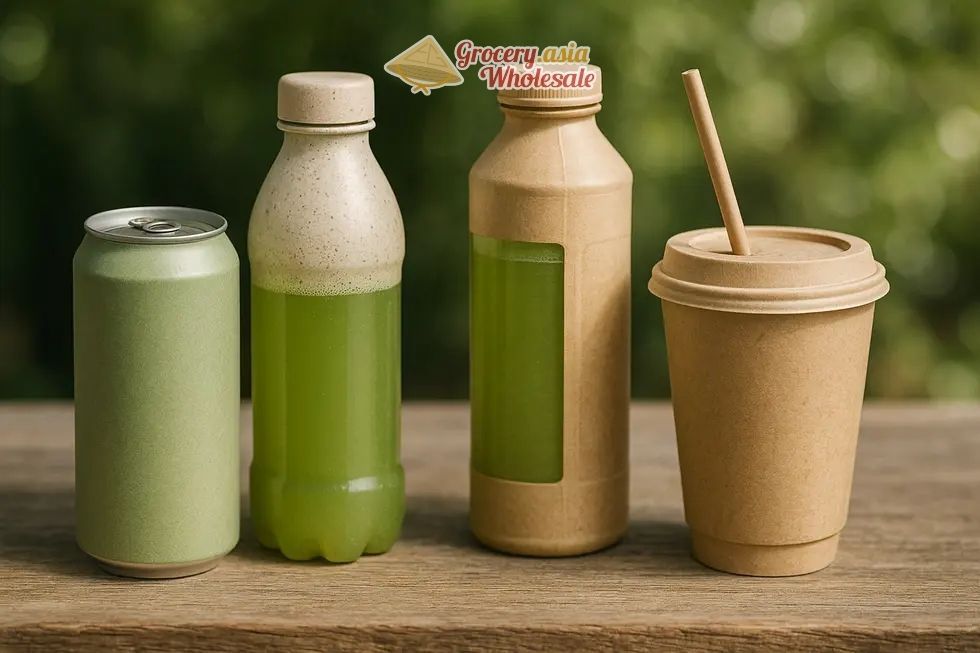No products in the cart.
Beverages News, Energy Drinks
Revolutionizing Energy Drink Packaging: Eco-friendly Solutions for Importers
As global attention turns towards sustainability, the packaging industry for energy drinks is stepping up its efforts to provide eco-friendly solutions. Packaging innovations not only address environmental concerns but also appeal to a growing base of eco-conscious consumers, especially important for wholesale importers seeking sustainable strategies. This article delves into various sustainable packaging options such as recyclable aluminum cans, recycled PET bottles, biodegradable secondary packaging, flexible drink pouches, and other innovative solutions—each contributing significantly to minimizing waste and enhancing brand image.
Table of Contents
Recycling Revolution: Aluminum Cans Leading Eco-Friendly Energy Drink Packaging
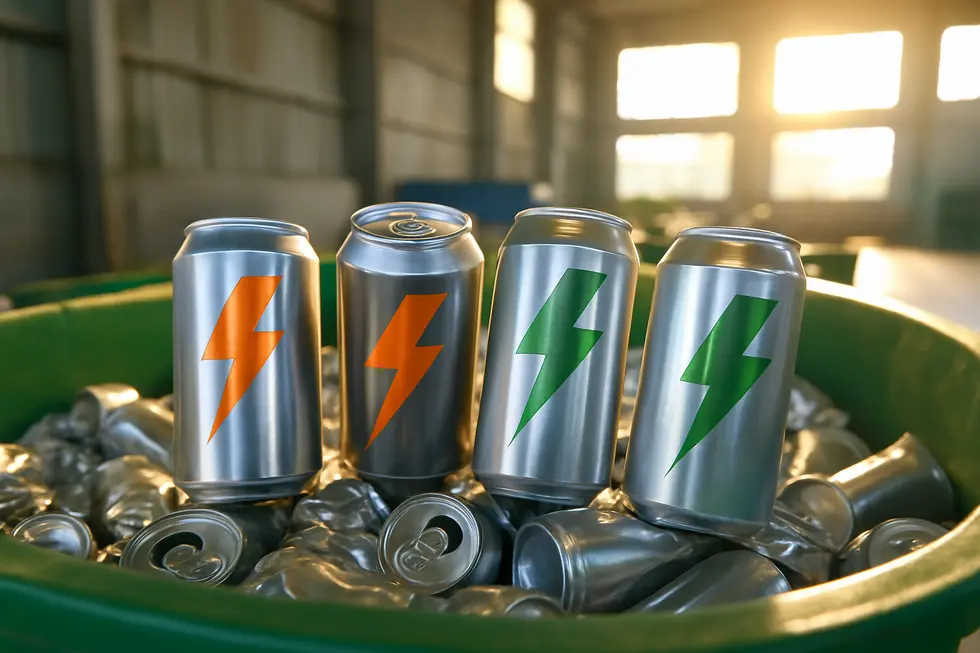
Recyclable aluminum cans stand at the forefront of eco-friendly energy drink packaging, offering a sustainable solution that aligns with consumers’ growing environmental awareness. Their durability and adaptability make them ideal for the robust nature of energy drinks. What truly sets aluminum cans apart is their infinite recyclability without any loss of quality, drastically cutting down on waste and fortifying the circular economy. Indeed, aluminum cans are recycled more frequently than any other beverage container, highlighting their potential in diminishing the energy footprint of packaging industries.
The environmental benefits of aluminum extend beyond their recyclability. Producing new aluminum is energy-intensive, yet recycling aluminum requires only a fraction of that energy—95% less to be exact—making it one of the most energy-efficient packaging options available today. Energy drinks, known for their high energy consumption in packaging, can significantly reduce their environmental impact by utilizing aluminum cans, aligning with broader sustainability goals.
The demand for aluminum cans, especially within the 201 to 450 ml range, is predicted to surge, driven by their suitability for both carbonated and non-carbonated beverages. This trend is further accelerated by major brands committing to 100% recyclable options, reinforcing their role in fostering sustainable consumer practices. As this market continues to grow, the emphasis on eco-friendly practices contributes not only to the brand’s image but also to a more sustainable future.
Harnessing Recycled PET for Energy Drink Packaging
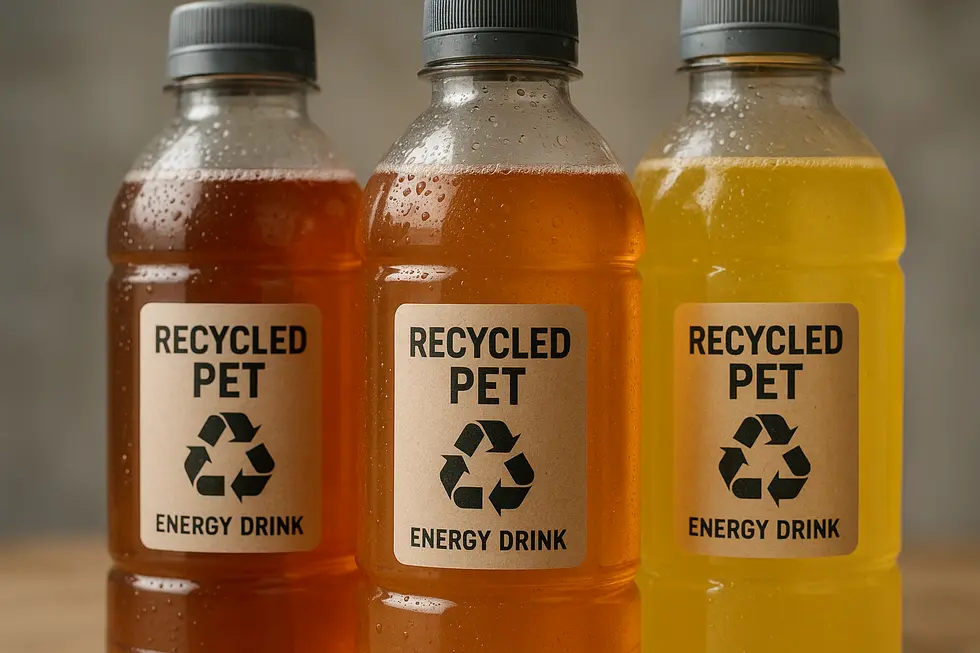
Recycled PET bottles are gaining prominence as a sustainable solution for packaging energy drinks. Their infinite recyclability addresses key environmental concerns by significantly reducing the reliance on virgin plastic. PET (polyethylene terephthalate) can be reprocessed into new bottles multiple times without quality loss, thereby decreasing resource consumption and greenhouse gas emissions. This cycle forms a cornerstone of environmentally conscious packaging strategies.
Advances in bottle-to-bottle recycling technology reinforce these efforts. Facilities like carbonLITE are transforming used PET bottles into food-grade recycled pellets, suitable for creating new energy drink containers. These innovations are pivotal as they allow for up to 100% recycled content, with FDA-approved applications for both cold and hot fill contexts, ensuring safety and sustainability.
Moreover, major brands are optimizing PET bottle designs to enhance recyclability. An example is the shift from colored to clear PET by Coca-Cola, reducing sorting complexities in recycling processes and improving the quality of post-consumer recycled material. From a lifecycle perspective, PET bottles are more energy-efficient to produce than glass alternatives, thus emitting fewer greenhouse gases.
The surging demand for recycled PET reflects broader consumer preferences for sustainable options, positioning recycled PET bottles at the forefront of eco-friendly innovations in energy drink packaging. For more information on advanced recycling technology, refer to the carbonLITE facility overview.
Sustainable Secondary Packaging: The Future of Energy Drink Carriers
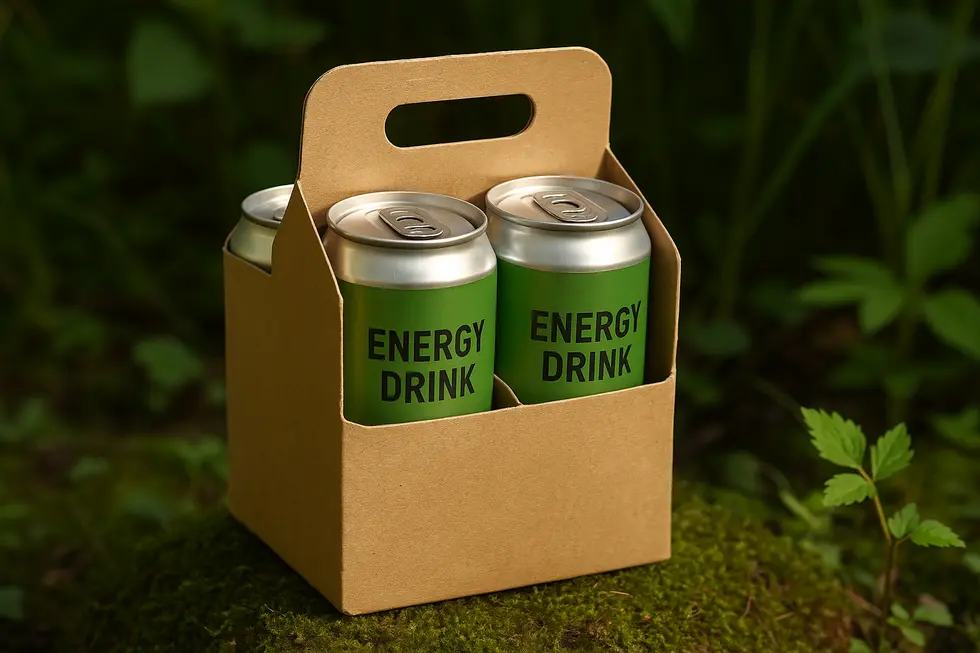
As sustainability takes center stage in consumer preferences and regulatory frameworks, the shift from traditional plastics to biodegradable and compostable alternatives in energy drink packaging is more relevant than ever. Secondary packaging, which wraps and protects primary containers, is evolving beyond environmentally taxing plastic solutions. Key alternatives such as kraft paper, bio-based plastics, and novel flexible packaging solutions are leading this green revolution.
Kraft paper packaging, for instance, offers a naturally biodegradable option, especially effective in multi-pack formats. It not only ensures safe transport of energy drinks but can also be recycled when printed with water-based inks. This aligns with eco-conscious consumer priorities source.
Moreover, innovative bio-based plastics like Polylactic Acid (PLA) provide a compostable solution, particularly suitable for industrial processes. PLA-based shrink films circumvent the recycling challenges typical of traditional plastics. Concurrently, certain flexible packaging solutions utilize mono-material polyethylene films, making them easier to recycle compared to complex multi-layered laminates.
The exploration of edible coatings, though nascent, hints at a future where secondary packaging might also contribute to food safety and sustainability. Despite strength limitations, these coatings underscore an industry-wide push toward zero-waste packaging strategies. Collectively, these innovations stand as testaments to the industry’s commitment to embracing a sustainable packaging future, reducing the environmental impact one energy drink at a time.
Flexible Drink Pouches: The Green Future of Energy Drink Packaging
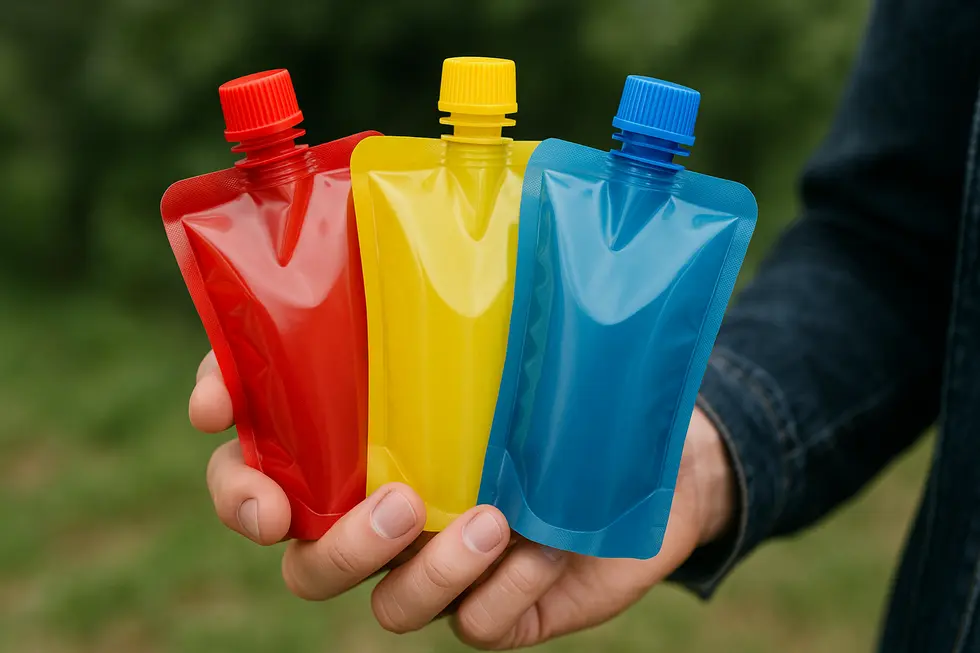
Flexible drink pouches are revolutionizing the landscape of eco-friendly packaging in the energy drink industry. These pouches stand out for their exceptional environmental benefits, primarily due to their reduced carbon footprint and material usage. Their lightweight nature makes transportation more efficient, minimizing both energy consumption and greenhouse gas emissions. Unlike traditional glass bottles and aluminum cans, flexible pouches require significantly less energy during production, further decreasing their environmental impact.
The production of flexible drink pouches involves fewer resources, which directly translates into less water usage and lower fossil fuel dependency. Yet, this innovative packaging solution is not without its challenges. The recyclability of flexible drink pouches remains an area needing improvement, as many are made from materials that are complex to recycle. Despite this, advancements in material technology are underway to overcome these hurdles by developing fully recyclable and biodegradable alternatives.
In this shifting market, companies are adapting to consumer demand for eco-conscious products by leveraging innovations in flexible packaging. Brands making the transition to sustainable options are likely to see enhanced customer loyalty and a growing market share. As research and development continue to focus on creating more sustainable solutions, the future of flexible drink pouches seems promising, shaping an eco-friendly path for the beverage industry.
Revolutionizing Energy Drink Packaging: From Aluminum Cans to Innovative Bioplastics
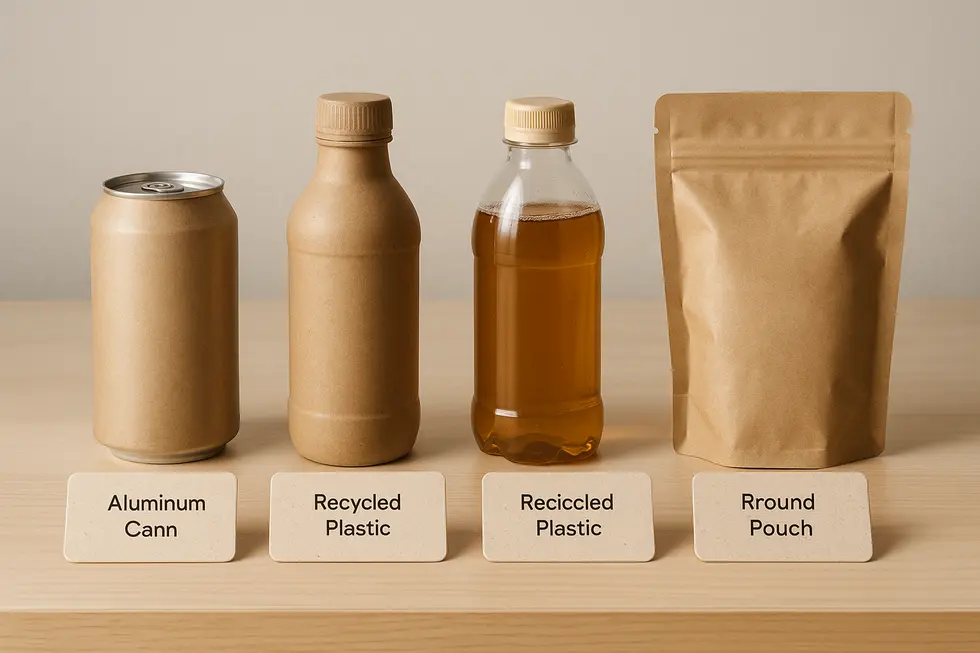
As consumers increasingly demand eco-friendly options, the energy drink industry is experiencing a shift toward innovative packaging solutions that align with sustainable values. Recyclable aluminum cans are a pioneering choice, celebrated for their infinite recyclability and ability to meet product convenience demands. These cans serve as a preferred option for beverages necessitating functionality and ease of transport, marrying consumer convenience with environmental responsibility. Additionally, recycled PET bottles have emerged as a viable alternative, especially when designed to complement existing recycling systems to optimize their eco-benefits.
In the realm of secondary packaging, biodegradable and compostable materials like cardboard carriers are gaining popularity. These solutions demonstrate a commitment to reducing environmental footprints without compromising on the structural integrity necessary for beverage storage and transport. However, true innovation in the sector includes exploring cutting-edge materials such as bioplastics derived from renewable biomass sources, which are garnering attention for their capacity to diminish reliance on fossil fuels and lessen carbon emissions.
Case studies, such as Ence’s cellulose-based packaging initiatives, underscore the potential of using locally sourced, biodegradable fibers. They champion not only environmental stewardship but also local economic support, positioning the company as a leader in sustainable practices in the beverage industry. Learn more about these innovative solutions here.
Final thoughts
The shift towards eco-friendly energy drink packaging signifies a pivotal moment for importers aiming to meet consumer demands for sustainability while ensuring compliance with international environmental standards. By embracing innovations such as recyclable aluminum cans, recycled PET bottles, biodegradable packaging, and flexible pouches, businesses not only contribute to environmental preservation but also foster stronger connections with eco-conscious consumers, positioning themselves as leaders in the sustainable market.
Curious about bulk pricing for energy drinks? Contact us now to get detailed quotes and shipping options.
About us
Asia Grocery Co., Ltd is a trusted distributor, wholesaler, and exporter of fast-moving consumer goods (FMCG) from Vietnam, backed by over 20 years of expertise. We deliver authentic products from globally recognized brands such as P&G, Unilever, Redbull, Coca-Cola, Pepsi, Asiadeli, along with traditional and culturally significant Asian products, catering to customers worldwide with a special focus on Vietnamese and Asian communities abroad.

